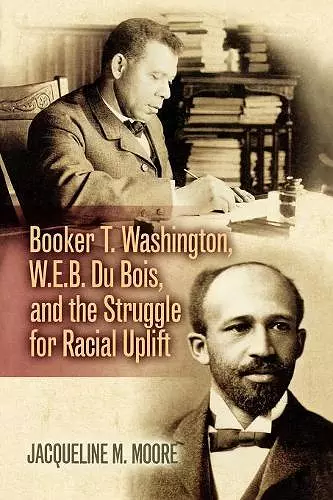Booker T. Washington, W.E.B. Du Bois, and the Struggle for Racial Uplift
Jacqueline M Moore author Jacqueline M Moore editor Nina Mjagkij editor
Format:Paperback
Publisher:Rowman & Littlefield
Published:15th Jan '03
Should be back in stock very soon

The beginning of the twentieth century was a critical time in African-American history. Segregation and discrimination were on the rise. Two seminal African American figures began to debate on ways to combat racial problems. Booker T. Washington and W.E.B. Du Bois developed different strategies for racial uplift as they actively competed for the support of the black community. In the process, Washington and Du Bois made a permanent mark on the debate over how blacks should achieve equality in America. Although other books address the Washington–Du Bois conflict, this text provides a detailed overview of the issues in a brief yet thorough narrative, giving students a clear understanding of these two influential leaders. Jacqueline Moore incorporates the latest scholarship as she examines the motivations of Washington and Du Bois and the political issues surrounding their positions. Accompanying documents allow students to see actual evidence on the issues. Moore contextualizes the debate in the broader terms of radical versus accommodationist strategies of racial uplift. Washington—an accommodationist—believed economic independence was most important to racial equality. W.E.B. Du Bois adopted more radical strategies, arguing that social and political equality—not just economic opportunity—were essential to racial uplift. This book traces the argument between these two men, which became public in 1903 when Du Bois published The Souls of Black Folk, which included an attack on Washington, his association with Tuskegee Institute's industrial education program, and accommodationism. The clash between Du Bois and Washington escalated over the next 12 years. Du Bois was a founding member of the National Association for the Advancement of Colored People (NAACP), an organization that often opposed Washington's gradualist approach. Although the NAACP became the major civil rights organization after Washington's death in 1915, the same issues Washington and DuBois debated surfaced in the 1960s Civil Rights Movement, and the debate raged once again between accommodationists and radicals. In time, both men's ideals faded until the same issues surfaced again in the 1960s, and the debate raged once again between accommodationists and radicals within the Civil Rights Movement. Booker T. Washington, W.E.B. Du Bois, and the Struggle for Racial Uplift is an excellent resource for courses in African American history, race relations, and minority and ethnic politics.
Jacqueline M. Moore's Booker T. Washington, W.E.B. Du Bois, and the Struggle for Racial Uplift breathes new life into the old Washington–Du Bois debate. Moore's narrative and accompanying documents underscore the complexity of the ideological conflict between Washington and Du Bois. Her book will empower students to analyze the issues and enable them to draw their own conclusions. This is an excellent teaching tool. -- John David Smith, professor, The University of North Carolina at Charlotte; author of Black Judas
This is the first book of its kind. It will work nicely as a supplementary text for American and African American history courses as well as for African American and Black Studies courses. The added dimension of the documents brings a human face to the debate over racial uplift between Washington and Du Bois, allowing readers to feel like active participants in the debate. -- Wilbert Jenkins, Temple University, author of Climbing Up to Glory
This sensitive, balanced, and amazingly comprehensive study provides rich insight into the ideas, methods, and motives of two remarkable men whose influence is still evident in discussions of racial uplift strategies in the twenty-first century. Written in lean, graceful prose, it places the Washington–Du Bois struggle in a broad historical context and explains how differences in the origins, experiences, and personalities of the two men shaped their disparate approaches to racial uplift. By any standard this is a first-rate book, one that deftly probes beneath the surface of the public debate to reveal the complexity of the struggle between black America's most influential power broker and its most renowned intellectual. In addition to appealing to both specialists and general readers, this book can be used with great profit in the classroom. -- Willard B. Gatewood, University of Arkansas, author of Aristocrats of Color: The Black Elite, 1880-1920
ISBN: 9780842029957
Dimensions: 232mm x 155mm x 12mm
Weight: 306g
194 pages